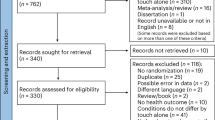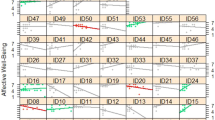Abstract
OBJECTIVE: This study examined the reduction in overweight and changes in eating-related behaviours in obese children treated with a family-based approach, in which the parents were the exclusive agents of change. Results were compared to the conventional approach in which children are responsible for their own weight loss.
DESIGN: A one-year longitudinal prospective design was used. Participants were randomly allocated for the experimental (parents as the agents of change) or the conventional (children as the agents of change) intervention.
METHODS: Sixty obese children (20% over ideal weight for age, height and gender) aged 6–11 y (mean±s.d. 9.2±1.0 y) were included in the study. Anthropometric measurements and biochemical tests were performed on the children and their parents before and after the programme, and both parents completed a sociodemographic and a family eating and activity habits questionnaire. Hour-long support/educational sessions were conducted by a clinical dietitian–14 sessions for the parents in the experimental intervention and 30 for the children in the conventional intervention. Individual sessions were held for members of both groups, when necessary.
RESULTS: Significant differences were found between the two groups in the reduction of exposure to food stimuli and changes in eating habits (eating while standing, watching TV, reading or doing homework, eating following stress and eating between meals). Mean weight reduction (by percentile) was significantly greater in the experimental intervention group (parent-only treatment) in comparison to the conventional intervention group (child-only treatment).
CONCLUSIONS: Treatment of childhood obesity with the parents as the exclusive agents of change, induces more behavioural changes as well as greater weight loss, than the conventional approach.
This is a preview of subscription content, access via your institution
Access options
Subscribe to this journal
Receive 12 print issues and online access
$259.00 per year
only $21.58 per issue
Buy this article
- Purchase on Springer Link
- Instant access to full article PDF
Prices may be subject to local taxes which are calculated during checkout
Similar content being viewed by others
Author information
Authors and Affiliations
Rights and permissions
About this article
Cite this article
Golan, M., Fainaru, M. & Weizman, A. Role of behaviour modification in the treatment of childhood obesity with the parents as the exclusive agents of change. Int J Obes 22, 1217–1224 (1998). https://doi.org/10.1038/sj.ijo.0800749
Received:
Revised:
Accepted:
Published:
Issue Date:
DOI: https://doi.org/10.1038/sj.ijo.0800749
Keywords
This article is cited by
-
Coffee leaf extract exhibits anti-obesity property and improves lipid metabolism in high-fat diet-induced C57BL6 obese mice
3 Biotech (2023)
-
Dietary habits and metabolic response improve in obese children whose mothers received an intervention to promote healthy eating: randomized clinical trial
BMC Public Health (2020)
-
The Effects of Parental Emotion Regulation Ability on Parenting Self-Efficacy and Child Diet
Journal of Child and Family Studies (2020)
-
A pilot summer day camp cooking curriculum to influence family meals
Pilot and Feasibility Studies (2019)
-
Obesogenic habits among children and their families in response to initiation of gluten-free diet
European Journal of Pediatrics (2018)



